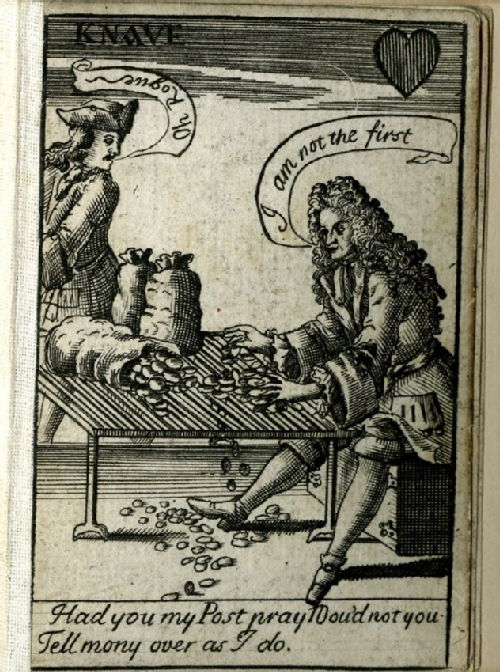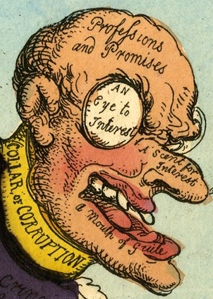All 2 entries tagged Walpole;
No other Warwick Blogs use the tag Walpole; on entries | View entries tagged Walpole; at Technorati | There are no images tagged Walpole; on this blog
November 28, 2020
Crony Contracts
In the pre-modern period appointments to office and awards of government contracts were often based on patronage, ‘friendship’, nepotism and sometimes straightforward exchanges of money. Are we in danger of slipping back into a seventeenth or eighteenth century world? When even a reporter from the Daily Telegraph thinks that the Tory government emits a ‘stench of corruption’, we should take this question seriously [Madeline Grant, BBC Andrew Marr Show, 22 November 202].
Emergencies, such as wars or pandemics, open the coffers of the state. The need to support the state’s efforts in a moment of need justifies very high levels of spending but then seems to foster loose or self-interested handling of public money that destabilise notions of fair profit, the balance between the public and private interest, and practices of accountability. Cronyism and corrupt contracts become far more possible.
In the seventeenth and eighteenth centuries Britain was engaged in huge expenditure on war. Civil war in the 1640s raised unprecedented sums of money but also headaches about accountability. The parliamentary forces ranged against the royalists created the first system of parliamentary committees scrutinising public expenditure, though there were frequent allegations that money disappeared into the hands of private individuals profiteering from the crisis and officials who abused their power to advantage themselves or their friends.
The second revolution of the seventeenth century, in 1688, propelled Britain into war with France that lasted, more ‘on’ than ‘off’, for the next 125 years. War became increasingly global in nature, as colonisation meant conflict in Europe spread across the world, and consequently state debt increased in leaps each time tensions flared. Contracts were handed out to supply troops with clothing, food and drink, and to financiers to pay the armed forces overseas. But all this was accompanied by what many contemporaries regarded as large-scale corruption. And over a period of several centuries structures were put in place to properly audit the expenditure; to prevent conflicts of interest; to prevent public money from being siphoned off into private hands; and to hold individuals to account for their behaviour in office. The system creaked each time it was put under strain by largescale emergencies; and often further measures were put it place.
Ironically it was the early Tory party, which emerged in the later Stuart period, that worried about the corrosive effect of large-scale state funding that they saw as disappearing into the pockets of their Whig rivals. The first Tory party was in part formed around hatred of Whig profiteering and cronyism. Thus in 1712, towards the end of a long war with France that had seen the national debt rise to unprecedented levels, the Tories argued that partisan self-interest was undermining the national interest. Money, they argued, was being purloined by Whiggish City financiers who became wealthy on the backs of the taxpayer. The Tories prosecuted one of the leaders of the Whigs, the future Prime Minister Robert Walpole, for a corrupt contract awarded to cronies and with built-in kick-backs. Walpole was also said to have presided over an unaccounted hole in the public finances of £35 million. Walpole was slung into the Tower of London for 'a high breach of trust and notorious corruption'. Indeed, throughout his long tenure as prime minister the Tory rallying cry against him was that he corrupted government and the political system. Anti-corruption was a key part of what it meant to be a Tory.

This Tory satire of 1740 depicts Walpole as an overblown idol whose arse had to be kissed if one wanted to get a public office and who was associated, as the words underline, with ‘Corruption’, ‘Venality’, ‘Folly’, ‘Vanity’ and ‘Pride’. © The Trustees of the British Museum.
So it’s somewhat ironic that the Tories today should be the subject of numerous accusations that they award excessively lucrative contracts to cronies without proper scrutiny and fast-track deals for insiders; that they appoint officials to important posts without any public competition; and that ministers are allowed to breach the codes designed to ensure high standards in public life and may even have broken the law in the way they have disregarded due process.
Emergencies always test the systems of the state to prevent corruption, and historically those systems have needed adjustment if they are found wanting. Indeed, after most periods of emergency in the seventeenth and eighteenth centuries there was a period of review and reform, and often of significant public anger. We seem to be approaching one such moment again.
For a good discussion about the current dangers of corruption see the Mile End Institute discussion at https://www.youtube.com/watch?v=k27w9VRE1gI.
For a warning, from the former director of Transparency International, about the dangers of corruption in Britain see https://www.qmul.ac.uk/mei/news-and-opinion/items/corruption-in-modern-britain-the-warning-lights-are-flashing-red--professor-robert-barrington-.html
For the National Audit Office report on government procurement during the Covid crisis see Investigation into government procurement during the COVID-19 pandemic - National Audit Office (NAO) Report
Boris Johnson ‘acted illegally’ over jobs for top anti-Covid staff | Politics | The Guardian
October 05, 2014
What would the first Tories have made of it?
A report published on 4 October 2014 by the union Unite [http://www.unitetheunion.org/news/tories-in-15-billion-nhs-sell-off-scandal/] has found that, since 2012, £1.5 billion of NHS funds has been contracted to private companies linked to 24 Tory MPs who voted for the Health and Care Act. Such contracts are legal; but is this very close relationship between elected representatives and private interests a form of corruption?
At the very least there is an irony here. The first Tory party, created in the late seventeenth and early eighteenth centuries, was highly critical of party politicians (their rivals, the Whigs) who sought to hoover up state assets by giving themselves lucrative contracts. At that period, of course, there was no national health service; but large amounts of government funds were spent on war with Louis XIV’s France and the same issue of contracts was at stake.
In December 1711, just over a year after the Tories had won a landslide electoral victory, a prosecution was launched by them against the duke of Marlborough, the military hero whose services to the country had been recognised with the gift from the nation of Blenheim Palace. To be sure, there was politics involved – Marlborough had been a Tory but had moved closer to the Whigs, and the Tories sought revenge. Marlborough's wife, the redoubtable Sarah, was also close to the Whigs. But in any case, the point at issue was a contract that the duke had to supply the army with bread, from which he made a 6% profit. Between 1702 and 1711, he received £62,000 (roughly the equivalent of about £5m in today’s money). Here, then, was public money being diverted into a contract from which Marlborough personally gained (and he had several crony friends who had also procured lucrative contracts to provide the army with clothing and supplies). The first Tory party was outraged. Jonathan Swift, by then a Tory partisan, satirised Marlborough’s avarice in his poem The Fable of Midas – the mythical king whose touch turned everything to gold – and in pamphlets Swift alleged that Marlborough, like other Whigs, was intent on profiteering from the war. Indeed, the object of the Tory attack included the whole new financial system – including the Bank of England that had been a Whig creation in 1694 – which Tories saw as a device to transfer wealth into the hands of their political enemies. ‘Corruption’ was a Tory rallying cry in the early eighteenth century, both in the reign of Queen Anne and then during the premiership of Robert Walpole, who was another of those prosecuted alongside Marlborough for his share in the contracts scandal and was expelled from the House of Commons for his ‘notorious corruption’.
The first Tories, then, saw it as their patriotic duty to oppose the corrupt and self-interested transfer of state funds into the hands of cronies by means of dubious contracts. What would they have made of today’s Tory party?
The text of the 1711 report into Marlborough’s contracts can be read at http://books.google.co.uk/books?id=tFMyAQAAMAAJ&pg=PT547&lpg=PT547&dq=1711+marlborough+contracts&source=bl&ots=7a69mwUvNu&sig=Gbfji9vU6ZhTNE0pLway3QPNALc&hl=en&sa=X&ei=-noxVNjcKcLO7gbJ44CwBg&ved=0CDoQ6AEwBQ#v=onepage&q=1711%20marlborough%20contracts&f=false
Image: A playing card satirising the duke of Marlborough as a money-making ‘rogue’
 Mark Knights
Mark Knights

 Please wait - comments are loading
Please wait - comments are loading

 Loading…
Loading…

